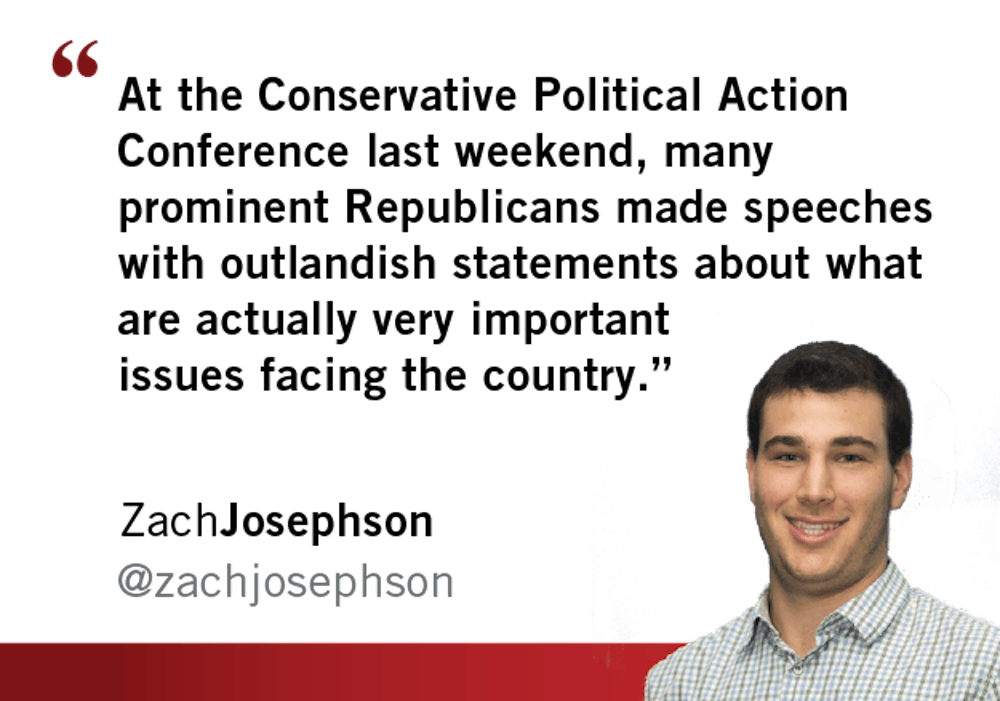Last weekend, grassroots conservative activists met just outside of Washington, D.C., for the annual Conservative Political Action Conference, generally referred to as CPAC. Each year, many big players in Republican politics show up to address the conference’s attendees, but this year's series of speeches show that either CPAC isn’t actually a legitimate gauge of the GOP contenders or the GOP contenders are very out of touch on a number of serious issues.
This year’s conference started with a speech by former Alaskan Gov. Sarah Palin, who addressed a series of veterans' issues including the increasing length of deployments and the number of soldiers who return home with PTSD. In her speech, Palin attempted to place the blame for the problems our veterans are facing on the Obama administration, as opposed to the former administration responsible for starting two wars.

According to Newsweek, Palin said, “Oh, the naïve Obama State Department. They say we can't kill our way out of war. Really? Tell that to the Nazis. Oh wait, you can't. They're dead. We killed 'em.” It seems unclear to Palin, but the answer to a never-ending war isn’t to continue fighting the war in the hope that it will suddenly end. There comes a time when it is necessary to say enough is enough and bring your troops home.
Palin started her speech by attempting to address a very important issue that has placed many of our servicemen and women in danger now that they have returned home. Unfortunately, she took her speech past the point of no return and indicated her belief that the U.S. should have continued to have soldiers on the battlefield, which would only have served to cause more harm to them and their families. Such is the nature of CPAC. There are very real issues that need to be discussed and the speakers in attendance appear willing to discuss them, but only until they take their argument past the point of being believable.
This was on display once again during Wisconsin Gov. Scott Walker’s speech to the conference. Walker has often been labeled a front-runner to receive the 2016 Republican presidential nomination and delivered a foreign policy speech in which he was clearly trying to display his grasp of foreign policy issues, something with which most governors don’t usually deal.
Instead of presenting a strong message about foreign policy, he confirmed some recent suspicions that he’s not yet ready for prime time. According to an ABC News report about the speech, Walker told his audience, “If I can take on 100,000 protesters, I can do the same across the world.” It seems obvious, but union protesters should be treated very differently than a terrorist organization. While a politician may disagree with the stance of a union they are usually non-violent organizations that don’t threaten the safety and well being of society.
Sen. Elizabeth Warren, D-Massachusetts, summarized the problem with Walker’s statement best on Twitter where she said, “If Scott Walker sees 100,000 teachers & firefighters as his enemies, maybe it's time we take a closer look at his friends.” The ABC News article goes on to include a statement from a Walker aid that said, “He was in no way comparing any American citizen to ISIS.”
While it would appear that Walker understands the severity of what he said, questions still loom about whether he understands the severity of the foreign policy issues he claims to know about or whether CPAC simply encourages its speakers to be more outrageous than the last speaker to simply score points.
Clearly there is a problem with the political messages coming out of CPAC. The speakers bring up serious issues that will face our nation in potentially grave ways over the next five to 10 years, but they don’t present reasonable solutions or responses. The Republican Party as a whole would be well served to embrace a less hyperbolic style of political discourse to avoid raising questions about their understanding of such important issues heading into a presidential election next year.
Reach the columnist at zjosephs@asu.edu or follow @zachjosephson on Twitter.
Editor’s note: The opinions presented in this column are the author’s and do not imply any endorsement from The State Press or its editors.
Want to join the conversation? Send an email to opiniondesk.statepress@gmail.com. Keep letters under 300 words and be sure to include your university affiliation. Anonymity will not be granted.
LikeThe State Presson Facebook and follow@statepresson Twitter.




